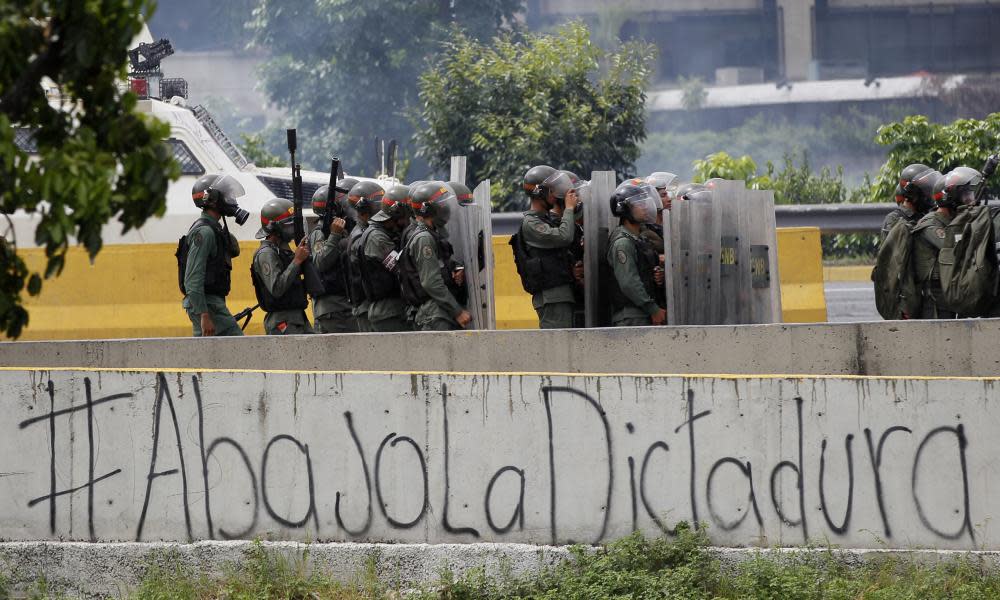Venezuela opposition blasts president's plan to rewrite constitution and delay elections

Venezuelan opposition leaders have reacted with fury to the unveiling of President Nicolás Maduro’s timetable to redraft the country’s constitution and delay regular elections until the end of the year.
Following two months of violent anti-government demonstrations that have led to at least 55 deaths, the president provided new details of the plan on Wednesday and claimed the proposed new constituent assembly would help the country regain peace and pave the way for renewed dialogue.
But his announcement enraged critics, who accused the government of adopting autocratic tactics and delaying regular elections it knows it will lose.
Henrique Capriles, the opposition leader who narrowly lost the last presidential election in 2013, called the move a constitutional fraud and asked his supporters to keep up the almost daily street mobilizations.
“It’s clear! The Venezuelan people don’t want a Maduro-styled constituent fraud and we don’t accept it. Let’s defend the constitution with article 333, and 350. We disobey,” Capriles tweeted, referring to the two articles in the existing constitution that allow for people to engage in civil disobedience if they feel their rights are being violated by the government.
His call was quickly and violently heeded. On Wednesday, anti-government protesters barricaded streets in Caracas and rallied outside the electoral council. The previous evening, the pro-government council said it was preparing for polls in July to choose members of the new constituent assembly – which will draft the new constitution – followed by delayed regional elections in December.
The streets of eastern Caracas were once again engulfed in the blueish fog of tear gas bombs that has come to signal the near-daily clash between security forces and Venezuela’s anti-government demonstrators. More than 30 people were taken to emergency care in the local municipality for injuries. A member of an opposition party was shot in the arm, and countless videos of street repression flooded social media.
These scenes have become the new normal for Venezuela, but on Wednesday, protesters said their resolve to remain in the streets had been renewed by Maduro’s latest announcement.
“A constituent assembly? What for? The government] really need to go and hide somewhere far away. They are an embarrassment to us, to themselves, to democracy,” said Mateo Lopez, a 20-year-old engineering student. “My brother had to leave this country because the universities here have nearly collapsed. I didn’t want to grow up without him, but this so-called socialist government has done nothing but destroy that which we had always taken pride in.”
According to Maduro, the constitution will be drafted by 540 people. Two-thirds of them will be elected at the municipal level and the remaining third chosen from different civil society groups, including small-holding farmers, businessmen and indigenous communities.
Not included are groups representing academics, military officers and members of the LGBT community.
The system has been criticised as undemocratic because it gives disproportionate weight to small, rural communities that tend to vote for the government in comparison with large, urban centres that have traditionally voted against it.
“Maduro has now taken the final step he needed to dissolve all public powers to fit his needs. It is the most blatant attempt to undermine the country’s rule of law,” Eugenio Hernandez-Breton, president of the Caucus for Political and Social Sciences of Venezuela’s Central University, said.
“The fundamental basis of democracy has been destroyed. The government is quite simply saying that 540 people will decide for the millions of Venezuelans who, instead, have quite clearly said that what they want are elections,” he added.
So controversial is Maduro’s latest move that criticism is also coming from within his ruling party, widely known for punishing even the most subtle dissent.
In a widely quoted and reproduced opinion piece, Mari Pili Hernández, former president of the state-run TV station who was – until now – known as a staunch government ally, wrote: “I am not willing to give 500 people a blank cheque, even if they were the most intelligent, honest and correct people in the planet. This contradicts the spirit of all constitutional texts and above all the fundamental principles of Chavismo. It is false that this constituent is the road to peace. It will just divide us further as a nation.”
Venezuela has been racked with protest protest since early April when the supreme court ruled the opposition-led parliament was in contempt of law and thus unable to legislate. Although the decision was partially reversed, the government’s legitimacy has come under scrutiny after a popular effort to subject Maduro’s mandate to a recall referendum last year was thwarted.
This week, the hardest-hit area was the central, prairie state of Barinas, where five young men died in clashes with security forces, and where the childhood home of the late president and Maduro’s mentor, Hugo Chavez, was burned down after a 17-year-old student was shot in the chest allegedly by a national guard. The local offices of the electoral council were also burnt.
Last week, the US Treasury sanctioned all the magistrates of the government-friendly supreme court.
The Organization of American States has called a meeting of its members next week to discuss Venezuela and last week.
In the meantime, Venezuelans continue to grapple with the world’s highest inflation, and the second-worst murder rate.
“I just want Maduro to explain to me how a new constitution is going to do anything to get food on our plates, or medicines in our hospitals,” said Pedro Jiménez, 60, who used to work as a mover but now has to spend most of his time in endless food queues. “He must not understand that people are dying, and that all we want is for him to leave.”

 Yahoo News
Yahoo News 
